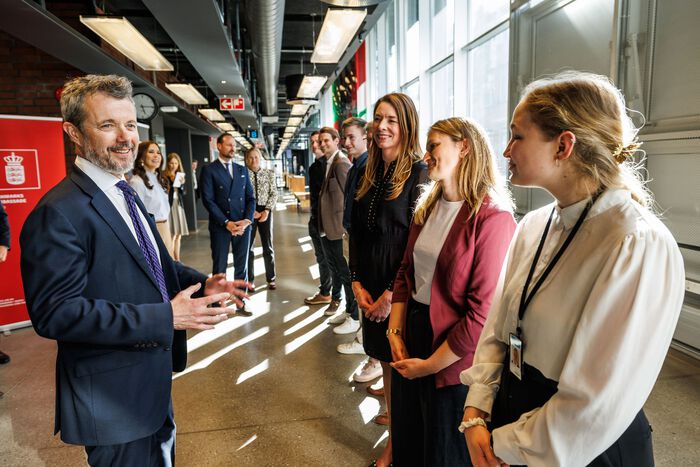
Marianne Løken is a Norwegian researcher with a special interest in natural science didactics, or “the science of teaching science”. During her doctoral program at the University of Oslo, Løken studied why a total of 17 young, female college and university students chose to enter male-dominated studies like technology, engineering, mathematics or physics. One of Løken’s important findings is that some of the campaigns that were meant to recruit young women may have made matters worse instead of better.
You can also read this article in Norwegian
One of the informants reported that the effect of some of the role models she had been exposed to in different recruitment campaigns had been ambiguous at best, if not outright counterproductive. The role models were adult and successful women in positions that young female students may dream of attaining – but such models can also become intimidating because they are simply not realistic. Their almost unachievable careers may trigger anxiety instead of inspiration among those who are in the beginning of their studies.
“If the role models or “heroines” are too successful, they can have a negative effect. They run the risk of giving young women the impression of something unattainable or alarming”, the informant wrote.
Studied atypical educational choices
Several other informants agreed that some of the role models didn’t really inspire them. But, they differed in their opinions of whom they had been inspired by.
“My study examines two main questions: How can empirical analyses of young women's personal choices lead to increased knowledge about atypical educational choices? And how can gender-theoretical and post-humanist perspectives contribute to the rewriting of stories about atypical educational choices?” Løken explains. She defended her thesis at the UiO’s Department of Physics in early June.
Women are not a homogeneous group
The anxiety-producing role models are by no means the only problem revealed in Løken’s research. Marianne Løken emphasizes that when dealing with gender-based categories in examining preferences for educational choices, it is possible to miss important nuances that may be essential in the development of measures to increase diversity and gender balance in male-dominated studies.
"I have looked at some of the recommendations from earlier research on educational choices. Some of these recommendations, which may have been used in major recruitment campaigns, are based on a stereotyped understanding of gender that may not be explicitly expressed. The result is that girls and young women are treated mainly as a homogeneous group – which they definitely are not!” Løken points out.
“In short: Girls are not drawn in droves to studies of chemistry study if you tell them that they can produce cosmetics in the laboratory. My informants are instead underlining that they don’t want to be treated as a group of cosmetics aficionados, or as any other kind of group. One of my main findings is that you can’t find one thing that makes young women want to become scientists. Women are diverse, in the same way that men are diverse – and they have a wide selection of individual interests”.
The European Commission was clearly not thinking about the diversity among young women when they produced the recruitment video "Science is a Girl Thing", which is all about make-up and high heels. Marianne Løken agrees with those who criticized this production in 2012. The video is still available on YouTube, together with some of the criticisms about reinforcing the very stereotypes that tend to push young women away from science..
The solution is tailor-made actions
Marianne Løken suggests that any new recruitment campaigns should focus on not treating girls or young women as a homogeneous group. They should instead be more focused on targeted, tailor-made measures that can reach different types of girls.
Løken’s research implies that the recruiters could learn something from other industries. Take for example the all-female pop group Spice Girls, which sold millions of records in the mid- and late 1990s. The group consisted of five totally different characters: «Scary», «Sporty», «Baby», «Ginger» and «Posh» Spice, and many girls could identify with at least one of them. The TV series Friends followed a similar principle, and there are several other examples.
"If you are serious about stimulating diversity and recruiting women into traditionally male-dominated areas, you should invest more resources in finding or developing a set of different role models. Many of the young women in my study said – independently – that they had met several role models that seemed scary rather than stimulating. Some of them even named specific women who were presented as role models, but instead appeared as over-achieving superwomen”, Løken explains.

Marianne Løken has an interdisciplinary background, with studies in both social anthropology and special needs education before embarking on a doctorate in natural science didactics. She is currently a special adviser at The Norwegian Directorate for Education and Training. The doctoral project started because Løken wanted to study the socio-cultural perspectives around stereotypes and barriers in relation to the recruitment of young women in natural sciences and technological studies.
“When I began to study this topic, I discovered several elements that were hard to explain. I also discovered that the field was lacking a theoretical basis, so I had to start looking around for something I could use. In the end, I landed on posthumanism – which is quite far removed from the everyday conceptions at the Faculty of Mathematics and Natural Sciences. This theory is, briefly put, based on using a sociological-materialistic perspective and juxtaposing the human perspectives with the non-human or material aspects”, she explains.
With the new perspective, Løken noticed new elements in the informants’ reports and developed a language that could be used to talk about their experiences in a new way. In short: her thesis has contributed to a new theory in the field of science didactics.
"I wanted my research to be of practical use, and I hope that other researchers will be tempted to develop the results further. For decades, we have discussed how the interests of young women lead them to atypical or typical educational choices, but without considering that these interests must have an origin. My research implies that material experiences may have an impact on educational choices, and this is an insight that can be of use for recruitment campaigns in the future, suggests Løken
A variety of role models
Marianne Løken's study of the reports from young women reveals that the young women who participated in the study, perceived some of the role-models used in recruitment campaigns as outright annoying.
"One of the recruitment campaigns presented women as particularly empathetic and caring, so they should start studying natural sciences. But one of my informants reacted to this by emphasizing that she didn’t choose science because she wanted to “save the world”, and another informant made it clear that she didn’t really like working with people. Yet another informant emphasized that she didn’t choose chemistry because she wanted to develop cosmetics for L'Oreal. In general: Most young women don’t want other people to tell them what they should be interested in", Løken explains.
“One of my conclusions is that both the informants and researchers who have been studying educational choices, have been lacking a language that is well suited to talk about these things. For example, the informants may distance themselves from gender stereotypes and resist being placed in imposed categories. But on the other hand, they sometimes themselves use concepts that do exactly this. When they for instance describe themselves as “more tomboy than girlish” or explain that “I want to do this in a girlish way”, they are in fact using the same kind of categories that they don’t like other people to use, Løken comments.
“To summarize: I interviewed 17 young women, and they were all different. This may seem like an obvious insight, but sometimes, obvious things can hide in plain sight. The diversity among young women should be taken more into consideration in future recruitment campaigns aimed at attracting women to male-dominated studies”, Løken concludes.

PhD Marianne Løken, Fysisk institutt. Now: The Norwegian Directorate for Education and Training
Relevant scientific publications:
Astrid T. Sinnes, Marianne Løken: Gendered education in a gendered world: looking beyond cosmetic solutions to the gender gap in science. Cultural Studies of Science Education, June 2014, Volume 9, Issue 2, pp 343–364.
Marianne Løken: When Research Challenges Gender Stereotypes: Exploring Narratives of Girls’ Educational Choices. Understanding Student Participation and Choice in Science and Technology Education pp 277-295, 26 August 2014.





